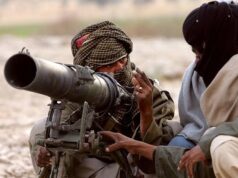UN Designated Terror Groups Generate Funds In Pakistan : Taiwan Media

It is February Pakistan will again be making a pitch for removal from the ignominious Grey List of the Financial Action Task Force (FATF)
In 2018, the country was placed in the list of “jurisdictions under increased monitoring”, more popularly known as the Grey List and was given an Action Plan comprising 27 Action Items for compliance pertaining to prosecutions, money laundering, terrorism financing, and targeted financial sanctions to choke the flow of funds to designated terrorist organizations, terrorists and their associates.
Some of these required Pakistan to make legislative and procedural changes while others required it to show demonstrative action against these entities.
Although Pakistan claims that it has complied with 24 out of the 27 Items and largely complied with the remaining three too, making it eligible for “white listing”, countries which objectively evaluate its performance, still believe that enough has not been done, especially when it comes to stopping the fund collection activities of proscribed groups and prosecution of terrorists for actual acts of terrorism.
Pakistan has been skirting the issue of prosecution by repeatedly convicting a small set of individuals on terrorism financing charges, giving them concurrent sentences instead of cumulative, and totally ignoring their involvement in major terrorist cases.
As a result, despite having friendly countries in the Asia Pacific-Joint Group of the FATF, Islamabad has failed to make the cut.
In February too, its prospects of exiting the Grey List are dim given the unfettered fund raising activities of proscribed terrorist groups like the Lashkar-e-Taiba (LeT) / Jamaat-ud-Dawah (JuD), Jaish-e-Mohammed (JeM) and their affiliates.
Pakistan’s main argument has been that the FATF process, which is supposed to be technical, is being politicised by a few countries to demand more than what is required.
It still does not see that the technical requirements are not check boxes that need to be ticked off, but are there for an obvious reason – to put an end to the scourge of terrorism. Its reluctance to put an end to the rather blatant fund raising activities of the LeT/JuD and JeM and complete impunity in ignoring their role in some of the most heinous acts of terrorism have convinced the international community of the lack of intent on Pakistan’s part to genuinely address the problem of terrorism.
In spite of being proscribed, recent print and social media posts of the LeT/JuD and the JeM reveal an alarming trend of over-ground activities including fund raising, promotion of Jihad and training.
Names of prominent leaders and contact details are blatantly displayed without any fear. The FATF does not have the means to verify the data presented by Pakistan. It trusts the information provided by the Government, as a result of which it has cleared 24/27 Action Items. At some point, however, the FATF also looks at the efficacy of the measures that have been claimed to have been implemented.
The FATF is well aware that the sanctions against the Afghan Taliban never worked and the situation is no different for the LeT and JeM too. One can’t help get the feeling that Pakistan only takes action against the proscribed terrorist groups that are targeting it. The data thus generated helps it to fill in the blanks or tick off the check boxes to satisfy the FATF. How else does one explain a proscribed entity like the JuD could carry on with its financial activities without any hiccups?
Reliable witnesses have reported that a meeting of JuD functionaries was held at Markaz Aqsa, Gujranwala, on November 13, 2020 with local businessmen who were asked to donate a part of their income to JuD as zakat/ushr for the Mujahideen fighting in Kashmir. An amount of PKR 17 Lakhs was collected during the gathering. The Taliban was able to sustain a campaign against the combined might of the West for two decades.
Its ready and unhindered access to funds, properties, perhaps even banking, ensured that the outfit was never under any pressure, at least from the financial side. The militancy in Kashmir has sustained for even longer, only due to the incessant money supply. The FATF may not have direct evidence but certainly it can see that despite its vast military strength, India has not been able to root out terrorism. Sometimes the evidence lies in the visible outcome, or rather lack of one.
One look at Afghanistan and Kashmir is enough to reach the obvious conclusion on Pakistan’s report card with the FATF. The conspicuous activities of JuD leaders and its Charities often get encouragement from the actions and statements emanating from the highest offices of the government.
Prime Minister Imran Khan’s acrimonious statements against French President Macron and more recently (Jan. 28) against adopting a “moderate” approach to appease the West are cases in point. Who can forget him calling Osama bin Laden a “martyr” in the National Assembly? His predilection for blurring the line between religiosity and extremism casts doubts on it being a slip of the tongue.
The government seems to be capitulating under pressure from the collective leadership of the five seminary governing bodies of Pakistan against the registration of Madrasas, an important requirement of the FATF to stop the spread of Jihadi ideology.
According to the daily ‘Dawn’ (Jan. 27), only 295 Madrasas out of a whopping 30,000 have applied for registration. On Jan. 26, clerics and seminary students protested outside the National Press Club, Islamabad, against the ICT Waqf Properties Act, 2020, promulgated in fulfilment of FATF requirements, calling it un-Islamic and aimed at violating the independence of Madrasas and vowing to boycott the registration process.
How long would it take for Pakistan to crackdown if the TTP were to hold such open conferences?
As highlighted earlier, the FATF’s requirements may be technical but serve a deeper purpose. If implemented seriously, they can seriously impact the capability of terrorists and Jihadists to inflict damage. In Dec. 2020, a JuD operative, Muhammad Tariq, was able to establish a private school on frozen property in Muslim Colony, Chenab Nagar, District Chiniot.
Such information is never available to the FATF but perhaps it is time now to pose some tough questions to Islamabad.
After all, freezing assets on paper is not what the FATF expects from Pakistan.
Similarly, Ameen Farooq, resident of Kulla Choor, PS Saddar JPJ Tehsil and District Gujrat, a notified 4th Scheduler earlier affiliated with the TTP but has now joined the Da’esh, goes about freely indulging in the outfit’s activities. He received weapons training at the JuD’s Abduallah Bin Masood Centre, Muzaffarabad for two weeks, a clear evidence of collaboration between the JuD and the Islamic State and indications of ominous designs of the Pakistani agencies. He was due for a personal hearing on Jan. 6, 2021, in connection with his appeal for removal from the 4th Schedule. It is not often that such ground reports are available, but when they are they expose the yawning gap between what Pakistan claims and what it actually does.
The Jaish-e-Muhammad (JeM) is also not far behind the LeT/JuD in its over ground activities, despite Islamabad’s claims that it has taken refuge in Afghanistan.
It has recently initiated two programs for its cadres namely “Al Tazkiya / Yaad-dihani” and “Rukniyat Saazi” under district level JeM functionaries. While “Al Tazkiya / Yaad-dihani” involves approaching the existing JeM cadres and functionaries through the local & regional JeM leaders to remind them of their duties and responsibilities towards the outfit, “Rukniyat Saazi” involves approaching prospective cadres for fresh recruitment and collection of funds.
Although Islamabad has been denying knowledge of JeM Amir Maulana Masood Azhar’s whereabouts, he has been regularly releasing write-ups which are published in JeM fortnightly magazine “MadinaMadina”.
A book written by him was inaugurated on Oct 26, 2020 at JeM Markaz Sanan Bin Salma, Tarnab Farm, Peshawar, Khyber Pakhtunkhwa. Islamabad’s claims that the Maulana and his associates have “fled” to Afghanistan, are not backed by the evidence of unfettered activities of his associates in Pakistan.
Islamabad, of late, has been accusing Kabul of harbouring terrorists inimical to its interests, an accusation that has few takers given its own track record of harbouring the world’s most dreaded terrorists.
For all its efforts to legitimize the Taliban and the Haqqani Network, they are still terrorists in the eyes of the common Afghan.
If Pakistan has managed to smuggle the JeM, one of the most dreaded terrorist organizations, also to Afghanistan, it is a matter of utmost concern to the Afghans, who have for decades lived under the umbrella of insecurity exported by Pakistan.
One need not go far, the recent decision of the Pakistan Supreme Court to release Omar Sheikh, principal accused in the Daniel Pearl murder case, points to the pathetic state of Pakistani law enforcement agencies and their inability to produce convincing evidence that can be upheld in a court of law.
The FATF’s emphasis on credible, sustainable and irreversible action on ground is unlikely to be met.




